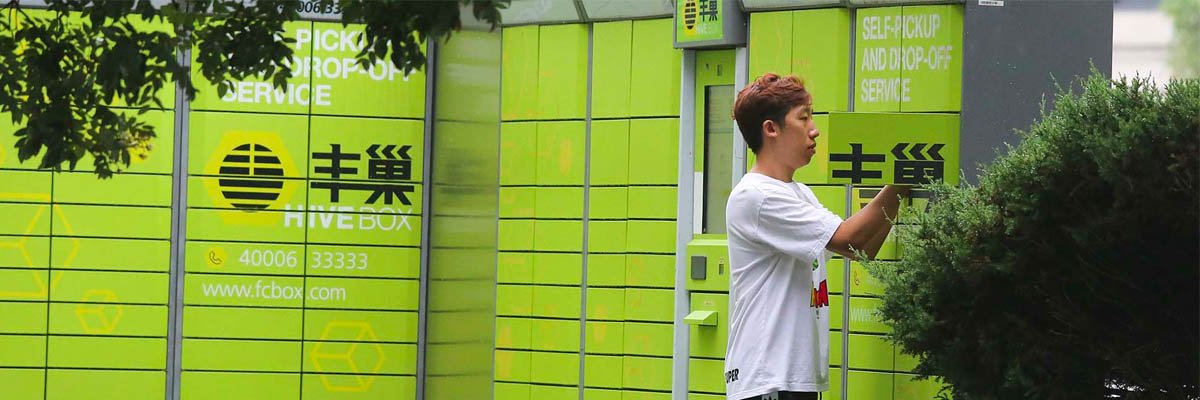How Can the World's Largest Locker System Hive-Box Be In Crisis at a Time Like This?
Hive-Box runs the world's largest express locker system, reaching 180,000 lockers in more than 100 cities across China serving 200 million people. In 2018, its users retrieved 2.5 billion packages - around 5% of China's total parcel delivery.
The express lockers allow consumers to have packages/online purchases delivered close to their apartment, and then pick them up when you're ready. If you've been for a walk in China, there's a good chance you would have seen their distinct green lockers.
During these times of soaring ecommerce, supported by contactless delivery, Hive-Box should be on Cloud-9, but a series of business decisions over the past month have seen boycotts and belittling from Chinese consumers.
Here's What Happened with Hive-Box:
Mid-Jan: Hive-Box's service was free, however there was a function similar to WeChat original articles-"Like The Author", where users can tip a delivery person. However the button to 'skip' the tip was somewhat hidden - many people didn't see it and they thought they had to pay. When this issue went public, Hive-Box made the skip button bigger around the time of the outbreak.
April 30: Hive-Box launches a new membership service (¥5 (70c) /month) where member's deliveries would be kept for 7-days for free. For non-members, deliveries would be held for just 12 hours, then charged ¥0.5 (7c) for every 12 hours thereafter, to a maximum fee of ¥3 (42c). Consumers were outraged given many consumers are often out from home for more than 12 hours due to long working hours, transport times and other interests, and office deliveries on the weekend would be caught.
May 4-7: A Hangzhou estate couldn't come to an agreement with Hive-Box over the new rules, so send notice around the neighbourhood and powered off all lockers
May 5: SF-Group-backed Hive-Box announced it would be taking over China Post-owned Sudiyi, giving it another 94,000 lockers, taking its market share to around 70%.
May 6: Hive-Box started charging for their service for the first time. This caused an uproar on social media and from housing estates as the takeover of Sudiyi a day earlier effectively allowed Hive-Box to leverage its monopoly and force increased prices to users.
May 7: A Shanghai estate surveyed residents about whether to continue using the service in light of the new fees. 82% said no, so the neighbourhood halted the service on May 11.
May 8: Other delivery agencies (except SF, who own HB) announced they would raise their prices to pass on the higher fees. These were later withdrawn as they realised they could not compete with the superior SF-Best on anything but price, and lowered prices again.
May 9: Hive-Box formally explained their reasons for the unpopular decisions: 1. The short 12-hour period was based on big data and best for delivery folk; 2. After reintroducing the fees, 5% more people collected their parcels within 12 hours; 3. A 1% higher turnover rate of the 180K lockers can result in a significant rise in resource utilisation. Hive-Box also issues a letter to the Hangzhou neighbourhood claiming it had violated the contract and it will recover resulting financial and goodwill losses.
May 13: The PRC State Post Bureau urged Hive Box take active measures to shoulder social responsibility, develop a solution, improve the pricing mechanism and respond adequately to consumers.
May 15: That morning, the Hangzhou estate who was first to ban them, said that they were willing to discuss with Hive-Box about reopening. In the evening, Hive Box announced they'd: 1. Extend the free period from 12 to 18 hours; 2. Not charge during holidays; 3. Not charge in office buildings during the weekend; and 4. Existing members get a free month of membership. By this time, 115 estates in Shanghai had already said "No" to Hive-Box.
Backlash Against the Price Rise
Many consumers remain outwardly angered with Hive-Box. However the compromises announced on May 15 have helped temper the situation, particularly extending the free hours from 12 to 18. Many felt that it is was within Hive-Box's rights to raise the price: they provide a service that costs money. Given they made a ¥781 million ($121 million) loss last year, many people realise that they can't run at a loss forever.
The issue was the process, as delivery people would put parcels in lockers without notifying users ... which Hive-Box already knew. On top of that, their timing was poor - announcing the price increase a day after taking over China Post-owned Sudiyi. Consumers were unhappy about having to pay twice for delivery. Hive-Box needs to figure out a way to make a profit, but it clearly needs to understand consumers better and deliver initiatives more thoughtfully.
The shenanigans have raised the threat of new competitors and alternatives and strengthening of others, with one Nanjing estate setting up lockers for themselves, and small shops who looked to store parcels.
Although many industries are consolidating in China and creating virtual-monopolies, the Hive-Box example illustrates that consumers will collectively vote with the their feet and force change, while potentially diluting the market as the result of poorly executed plans.


